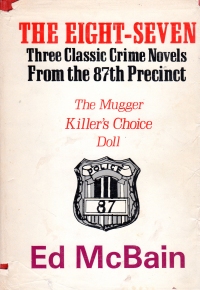 This book contains three Ed McBain novels from the 1950s and 1960s: The Mugger, Killer’s Choice, and Doll. I bought it four years ago, right after reading a paperback copy of Doll. I said I was in no hurry to read it, but I guess I was: Only four years on the to-read shelves of Nogglestead is pretty fast.
This book contains three Ed McBain novels from the 1950s and 1960s: The Mugger, Killer’s Choice, and Doll. I bought it four years ago, right after reading a paperback copy of Doll. I said I was in no hurry to read it, but I guess I was: Only four years on the to-read shelves of Nogglestead is pretty fast.
At any rate, The Mugger is one of the early ones in the series, and it deals with the primary mystery of a mugger who always thanks his victims and a secondary case of a young woman killed in a remote location attributed to the mugger. Kling is a patrolman in this book; I remember when he got promoted, and it was after this book. There were so many books in the fifties and sixties in this series that were more readily available in the 1980s that I remember reading so that it’s strange to think the recent war that Kling originally served in was Korea. In later books, it gets obscured to The War which could be Vietnam later or the Iraq Wars or Afghanistan later (although I don’t think this was emphasized in the twenty-first century books).
In Killer’s Choice, a woman who works in a liquor store is killed, and the detectives uncover multiple versions of the woman based on whom they interview. Was she a sinner or a saint, and which got her killed?
In Doll, a model is brutally killed in her bedroom while her daughter is in the next bedroom. The Kling is on the fritz after the recent death of his model girlfriend and gets suspended. Carella has an insight into the murder and gets knocked out and held by a sadistic compatriot of the murderer who gives him heroin. The doll in the title refers both to heroin and the the daughter of the victim’s doll which has a record and playback feature that picks up evidence in the murder. Four years ago, I didn’t like the book because the subplot with Carella is extraneous, but I’m in a more forgiving mood this year. As I read it with two others in the 87th Precinct series, I recognize that he’s doing something different with the books for the sake of doing something different. And perhaps trying to create a little sympathy for people who get addicted to heroin and are not vicious killers. Strange, fifty years later, that heroin addiction is a thing again.
McBain, like John D. MacDonald, is an author whose books I can read over and over again. It’s too bad that I don’t see many of the old McBain books at book sales–mostly just the hardbacks from after 1990. But this book shows how he changes with the times: the early ones are short paperback originals, but ten years later, the books are getting thicker to match the times and contemporary topics. By the end of his career, McBain’s novels matched the fat three hundred page thrillers of the present day. It’s a testament to his evolution and adaptability as a writer.
ONE MORE THING: What would McBain think of me? Well, I supported George W. Bush, so certainly not good. Also, in Doll, Andy Parker, the worst detective in the precinct, says this to a prostitute:
I’ve got a hi-fi set and also I belong to the Classics Club. I’ve got all those books by the big writers, the important writers. I haven’t got time to read them, but I got them all there on a shelf, you should see the books I got.
Brothers and sisters, I might own the largest collection of Classics Club books outside the heirs of Walter J. Black. And I read them once in a while. By “them,” I mean the ancient Greeks and Romans, and by “once in a while,” I mean every couple years.
What do you mean, I’m being defensive?


